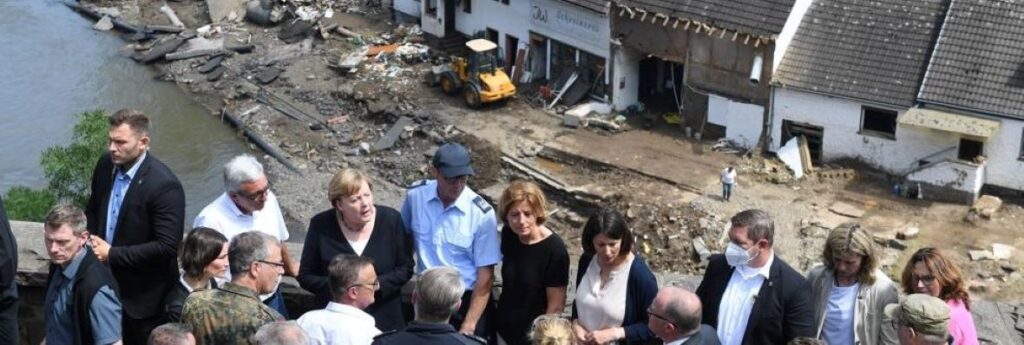German Chancellor Angela Merkel surveyed what she called a “surreal, ghostly” scene in a devastated village early this week, pledging quick financial aid and a redoubled political focus on curbing climate change as the death toll from floods in Western Europe climbed above 180.
Merkel toured Schuld, a village on a tight curve of the Ahr River in western Germany where many buildings were damaged or destroyed by rapidly rising floodwaters Wednesday night.
Although the mayor of Schuld said no one was killed or injured there, many other places weren’t so lucky. The death toll in the Ahrweiler area, where Schuld is located, stood at 112. Authorities said people are still missing and they fear the toll may still rise.
In neighbouring North Rhine-Westphalia state, Germany’s most populous, 46 people were killed, including four firefighters. Belgium confirmed 31 deaths.
Merkel said she came away from Schuld, still partly strewn with rubble and mud in bright sunshine, with “a real picture of, I must say, the surreal, ghostly situation.”
“It is shocking — I would almost say that the German language barely has words for the devastation that has been wreaked,” she said at a news conference in a nearby town.
Merkel said authorities will work to “set the world right again in this beautiful region, step by step,” and her Cabinet will approve an immediate and medium-term financial aid program on Wednesday.
Finance Minister Olaf Scholz told the Bild am Sonntag newspaper that more than €300 ($451) million will be needed immediately. And he said officials must set up a longer-term rebuilding program which, from experience with previous flooding, will be in the billions of euros.
“Thankfully, Germany is a country that can manage this financially,” said Merkel, who is stepping down as chancellor following an election in September. “Germany is a strong country and we will stand up to this force of nature in the short term — but also in the medium and long term, through policy that pays more regard to nature and the climate than we did in recent years. That will be necessary too.”
Scientists can’t yet say for sure whether climate change caused the flooding, but they insist that it certainly exacerbates the extreme weather disasters on display around the world.
“We must get faster in the battle against climate change,” Merkel said, pointing to policies already set in motion by Germany and the European Union to cut greenhouse gas emissions. “And nevertheless, the second lesson is that we must pay great attention to adaptation” to climate change.
Investing in fighting climate change is expensive, she said, but failing to do so is even more costly.
“One flood isn’t the example of climate change, but if we look at the loss events of recent years, decades, then they are simply more frequent than they were previously — so we must make a great effort,” Merkel said.
Although the rain has stopped in the worst-affected areas of Germany, Belgium and the Netherlands, storms and downpours have persisted elsewhere in western and central Europe. There was flooding over the weekend in the German-Czech border area, in Germany’s southeastern corner, and over the border in Austria.

